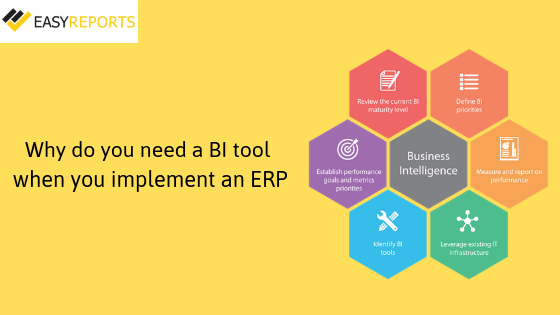August 26, 2019
Since its inception in 1997, BI has been compared to a number of analytical tools, from spreadsheets to Customer Relationship Management tools to ERP software.
An ERP likely contains data that was created from when the company started the business. How much of this data is still relevant for decision-making now? By implementing a BI tool, the company can reduce the clutter and see the critical business data their need to make more strategic and informed decisions.
Every business has its own objectives, vision, and necessities. To run a large company, with several departments and subsequent teams successfully, an effective ERP system gives a helping hand by coordinating all information and communication within the organization and assists management by providing a One Stop Solution, reduction in cycle time, achieving cost control and low working capital, it helps in coping up with latest technologies in order to satisfy the customers having high expectations.
Implementing an ERP system changes the working style of the employees within an organization. Deployment of ERP also looks for fewer errors and provides more efficiency in order to curtail cost in terms of money and time.
The ERP system is such that can be accessed anytime, anywhere regardless of the devices. Mobility will also help in expanding businesses. It will also assist businesses to run in a smooth and effective manner.
What is Business Intelligence?
Business Intelligence or BI is about getting the right information, to the right decision-makers and at the right time. BI leads to fact-based decision making and includes reporting, analytics as well as decision making.
BI functions with close proximity with ERP with the assistance of CRM. Coming together of ERP and BI together is similar to bringing two critical sides of an important business together i.e. getting data is important as getting data out
The crux is to deliver ERP and BI in tandem to help and fulfill the end vision to encourage user acceptance. BI is a combination of People – Process Technology that can add value to an organization.
Understanding how data becomes information and how information can then be transformed into intelligence, presented in a manner to support the decision-making process.
Need for a BI tool on Implementation of an ERP
Nowadays, ERP solutions are setup with integrated BI modules that enable companies to provide dynamic reporting and providing end-users with exactly what they want to see and when. Modern BI software goes a step further by creating a dynamic environment to consolidate all key data into one platform, for its users to manipulate data as and when required.
In the field of reporting, BI tool has had a transformative effect by integrating itself with ERP systems as it provides real-time insights to managers in order to make quick data-based decisions both for short as well as long terms.
BI software is strong enough to extract data from multiple sources, such as spreadsheets or other reports that come from various machine-specific software and associate it with the data in the ERP database. Thus, allowing it to collect data at the user’s fingertips in a way that makes sense for each individual stakeholder.
